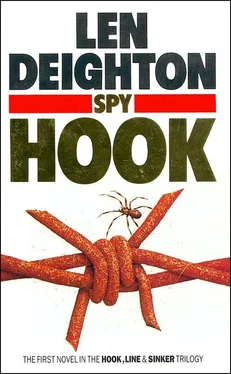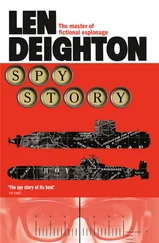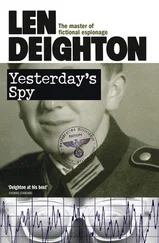Len Deighton - Spy Hook
Здесь есть возможность читать онлайн «Len Deighton - Spy Hook» — ознакомительный отрывок электронной книги совершенно бесплатно, а после прочтения отрывка купить полную версию. В некоторых случаях можно слушать аудио, скачать через торрент в формате fb2 и присутствует краткое содержание. Жанр: Триллер, на английском языке. Описание произведения, (предисловие) а так же отзывы посетителей доступны на портале библиотеки ЛибКат.
- Название:Spy Hook
- Автор:
- Жанр:
- Год:неизвестен
- ISBN:нет данных
- Рейтинг книги:4 / 5. Голосов: 1
-
Избранное:Добавить в избранное
- Отзывы:
-
Ваша оценка:
- 80
- 1
- 2
- 3
- 4
- 5
Spy Hook: краткое содержание, описание и аннотация
Предлагаем к чтению аннотацию, описание, краткое содержание или предисловие (зависит от того, что написал сам автор книги «Spy Hook»). Если вы не нашли необходимую информацию о книге — напишите в комментариях, мы постараемся отыскать её.
Spy Hook — читать онлайн ознакомительный отрывок
Ниже представлен текст книги, разбитый по страницам. Система сохранения места последней прочитанной страницы, позволяет с удобством читать онлайн бесплатно книгу «Spy Hook», без необходимости каждый раз заново искать на чём Вы остановились. Поставьте закладку, и сможете в любой момент перейти на страницу, на которой закончили чтение.
Интервал:
Закладка:
Gloria gave a little shrug and closed her eyes.
12
I didn't realize what had happened to some of those little hotels in Ebury Street. It used to be a no-man's-land, where the rucksack-laden hordes from the bus terminal met the smart set of Belgravia. In a curious juxtapositioning that is peculiarly English, Ebury Street provided Belgravia with its expensive little boutiques and chic restaurants and offered budget-conscious travellers cheap overnight lodging. But change was inevitable and Werner had found a small but luxuriously appointed suite 'all major credit cards accepted' with twenty-four-hour service and security, rubber plants in the lobby and Dom Perignon in the refrigerator.
'Have you eaten?' said Werner as soon as he opened the door to me.
'Not really.'
'Good. I've booked a table for us. It's just round the corner. I read a rave review of it in a flight magazine coming over.' He said it in a distracted way, as if his mind was really on something entirely different.
'Wonderful,' I said.
'No,' said Werner. 'I think it might really be good.' He looked at his watch. He was agitated: I knew the signs. 'The magazine said the fresh salmon mousse is very good,' he said as if not totally convinced.
'How did you find this hotel, Werner?' He was my best friend, but I never really understood Werner in the way I understood other people I'd known for a longtime. He was not just secretive; he masked his real feelings by assuming others. When he was happy, he looked sad. When he made a rib-tickling joke, he scowled as if resenting laughter. Winning, he looked like a loser. Was that because he was a Jew? Did he feel he had to conceal his true feelings from a hostile world?
'It's an apartment, a service apartment, not a hotel,' he corrected me. The rich of course have more words than the rest of us, for they have more goods and services at their disposal. 'A fellow I do business with at Kleinwort Benson keeps it as his London base. He said I could use it. Champagne? Whisky or anything?'
'A glass of wine,' I said.
He stepped into the tiny kitchen. It was just a fluorescent-lit box, designed to encourage the use of the 'service' rather than a place to do any proper cooking. He took a bottle of wine from the refrigerator, a Meursault; the bottle was full but uncorked as if he'd guessed what I would like to drink, and prepared for my arrival. He poured a good measure into a Waterford wineglass and put the bottle back again. The refrigerator's machinery began to purr, setting off a soft rattle of vibrating bottles.
'Happy days, Werner,' I said before I drank.
He smiled soberly and picked up his wallet from a side-table and made sure his credit cards were all there before putting it in his pocket. Meursault: it was a luxury I particularly enjoyed. I suppose Werner could have guzzled it all day long if he'd had a mind to.
Most people were hurtled through life on a financial switchback, a roller-coaster that decided for them whether they must economize or splurge. Not Werner; Werner always had enough. He decided what he wanted – anything: whether it was a little place round the corner that did a good salmon mousse, or a splendid new car – and put his hand in his pocket and bought it. Mind you, Werner's needs were modest: he didn't hanker for yachts or private planes, keep mistresses, gamble or throw lots of extravagant parties. Werner simply had money more than sufficient for his needs. I envied his unbudgeted easygoing lifestyle; he made me feel like a money-grubbing wage-slave because, I suppose, that's exactly what I am.
I took my wine and sat down in one of the soft leather armchairs and waited for him to tell me what was distressing him so much that he would fly to London and drag me up here to talk with him. I looked around. So it was an apartment. Yes, I could see that now. It was not quite like a hotel suite; it looked lived in. Glenn Gould was playing Bach uncharacteristically softly on the CD player, and there were two big hideous modern paintings on the walls, instead of the tasteful lithographs that architects and interior designers bought wholesale.
It was a place used by men who were away from home. You could tell that from the books. As well as year after year of outdated restaurant guides, street maps and museum catalogues, there were the sort of books that help pass the time when all the work is done. Dog-eared detective stories of the sort that can be read over and over again without any feeling of repetition, very thin books by thin lady novelists who win prizes, and very thick ones by thick lady novelists who don't. And a whole shelf full of biographies from Mother Teresa to Lord Olivier via 'Streisand the Woman and the Legend '. Long long hours away from home.
Werner had responded to my toast by drinking some mineral water from a cut-glass tumbler. It had a lemon slice in it and ice too. It was as if he wanted to pretend it was a real drink. He sank down into an armchair and sighed. The black beard – now closely trimmed – suited him. He didn't look like a hippie or an art teacher, it was more formal than that. But formality ended at the neck. His clothes were casual, a black long-sleeve woollen pullover, matching trousers, rainbow-striped silk shin and shiny patent shoes. His hair was thick and dark, his pose relaxed: only his eyes were worried. 'It's Zena.' He reached across to get a coaster from the shelf and moved my wineglass on to it so it would not mark the polished side-table. Werner was house-trained.
Oh, no, I thought. Not an evening of talking about that wife of his, it was more than even a best friend should be expected to endure. 'What about Zena?' I said, trying to make my voice warm and concerned.
'More precisely, that damned Frank Harrington,' said Werner bitterly. 'I know what Frank means to you, Bernie, but he's a bastard. He really is.' He watched me to see if I would take offence on Frank's behalf, and he pinched his nose as he often did when distressed.
'Frank?' Frank Harrington was an amazingly successful womanizer. Linking Frank and Zena's names meant only one thing to me. Some years back, Frank and Zena had had a tempestuous affair. Like some nineteenth-century rake, he'd even set her up in a little house to await his visits. Then – the way I heard it – Zena got fed up with sitting waiting for Frank to find time for her. There was nothing of the nineteenth-century mistress about Zena. Since then I suspected that Zena had found other men, but always she returned to poor old Werner. In the long term he was the only one who would put up with her. 'Frank and Zena?'
'Not like that,' said Werner hurriedly. 'He's using her for departmental work. It's dangerous, Bernie. Bloody dangerous. She's never done anything like that before.'
'You'd better start at the beginning,' I said.
'Zena has relatives in the East. She takes them food and presents. You know…'
'Yes, you told me.' I reached for the little bowl of salted almonds but there were only a couple of broken pieces left buried under salt and bits of skin. I suppose Werner had eaten them while sitting here waiting for me and worrying.
'She went over there last week.' In German over there – 'druben' – meant only one thing, it meant the other side of the Wall. 'Now I've discovered that that bloody Frank asked her to look up someone for him.'
'One of our people?' I said guardedly.
'Of course. Who else would they be if Frank wants her to look them up for him?'
'I suppose so,' I conceded.
'Frankfurt an der Oder,' said Werner. 'You know what we're talking about don't you?' Despite the level voice he was angry now: damned angry, and somewhere in the back of his mind he was implicating me in this development of which I knew nothing, and preferred to know nothing.
Читать дальшеИнтервал:
Закладка:
Похожие книги на «Spy Hook»
Представляем Вашему вниманию похожие книги на «Spy Hook» списком для выбора. Мы отобрали схожую по названию и смыслу литературу в надежде предоставить читателям больше вариантов отыскать новые, интересные, ещё непрочитанные произведения.
Обсуждение, отзывы о книге «Spy Hook» и просто собственные мнения читателей. Оставьте ваши комментарии, напишите, что Вы думаете о произведении, его смысле или главных героях. Укажите что конкретно понравилось, а что нет, и почему Вы так считаете.












